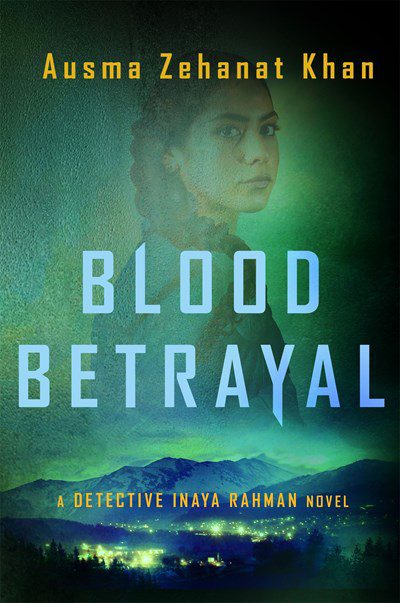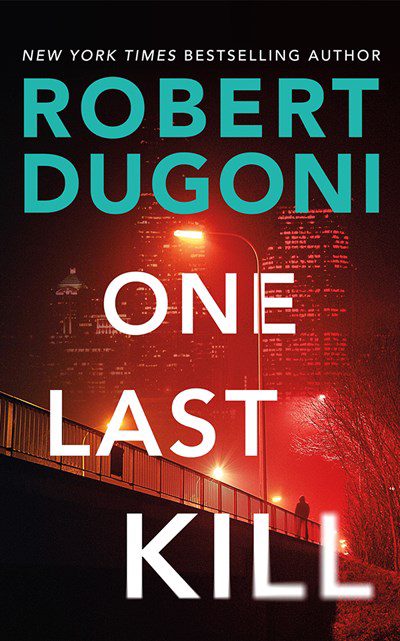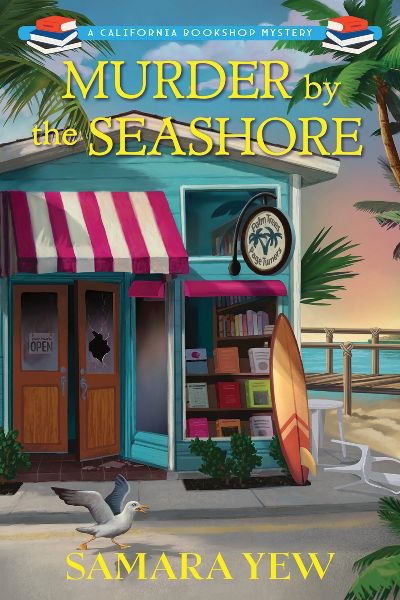Alex Wright and her sister, Hanna Eastham, co-owners of Murder and Mayhem: Killer Chocolates and Bookshop, are hard at work preparing goodies in their Montana store for the Festive Foods Chocolates Competition. It’s just their luck that at the same time as they’re hard at work preparing sweets for the local high-school reunion they’re also smack in the middle of their busiest season, the winter holidays. Still, they’re muddling through until a murder at the reunion stops the community in its tracks. A man who was unpopular in school and has increased his enemy count by being “gropey” at the reunion (Hanna suspects he has “an octopus in his bloodline”) meets his not-so-sweet end. And unbelievably, Hanna is suspected in the killing. The elements we love in a cozy are all here: tight family relationships, romantic interests with law enforcement, off-screen killings, food, and bookstores. What’s not to love? This one has rich characterization to boot and a story that will keep readers guessing till the last Strychnine Strawberry chocolate is but a gooey memory.
Women Sleuths
Nothing was ever the same for Sara Linton after the night she was attacked. Though the police apprehended the culprit, Sara has struggled to deal with the trauma ever since. She’s now engaged to GBI Special Agent Will Trent, and they are crafting wedding plans. When Sara promises to pursue justice for another young woman, who dies, she has no idea that this will force her to confront the darkness and memories she has been avoiding for years. Will wants to help, and what they uncover leads to connected attacks with ties to recent incidents. Slaughter is a master of telling a story with horrific elements and spinning it to be both clinical and compelling. She dives into the characters we love and provides more insight into what has made them who they are, which makes them come alive on the page. The ABC television series Will Trent was recently renewed for a second season, and its popularity will steer readers to pick up this book. Whether a newcomer to the series or a fan who has read the previous entries, readers will find this one of the best to date.
Flower does a magnificent job of opening up the world of mid-19th century Amherst, the Dickinson family, and especially young Emily, who has yet to become the eccentric recluse of her later years. In this volume, Austin and his wife have returned from their wedding trip and moved into the mansion next door to the family home, just in time to welcome their houseguests Ralph Waldo Emerson—who has come to lecture at Amherst College—and his secretary, Luther. Narrated by Emily’s maid Willa Nobel, we’re privy to all the family gossip, while Emily seeks a way to share her writing with Emerson. But the death of young Luther, who’s found in a bed of black-eyed Susans, sets Emily and Willa on a path to satisfy the great Emerson’s questions, quell the vociferous speculation, and clear the Dickinson name. This series is historical crime fiction at its best, balancing insight into the past with a fast-moving investigation into the crime.
Khan’s latest features extremes: fast moments of violence and the long years of condemnation and recriminations that follow, and found families—good and evil—in contrast with those we’re born into. Blackwater Falls, CO, Community Response Officer Inaya Rahman is facing a ghost from her Chicago PD past: John Broda, an officer who badly beat her. Now he wants a favor. Broda’s son, another officer, is accused of shooting an innocent young man, and Broda knows that Inaya is both smart and caring enough to find out the truth. In return, he’ll give her a recording she’s long wanted of another officer implicating himself in a racist crime. It’s not Rahman’s case, and she clashes with her boss, Qas Seif. Inaya and Qas’s feelings for each other, and the family ties that are a highlight here, only complicate matters. Further difficulties are added by a parallel crime, this time one Inaya is officially working on: a white officer who’s near retirement shoots a young Black man, and the community is seething. Khan excels in creating multifaceted characters whose engrossing stories bring up social questions to which there are no easy answers. As in the best crime fiction, the solution here is both satisfying and unexpected.
A newspaper retrospective of an unsolved killing spree brings back more than memories in Dugoni’s latest thriller. The Route 99 serial killer seemed to stop almost three decades ago, but why? The upcoming article reflecting on the murders has Tracy Crosswhite investigating the cold case with Johnny Nolasco, her superior, whom she does not get along with. He ran the original task force, and failing to deliver a suspect still haunts him. The two must overcome their differences to see if they can find justice and bring closure to the victims’ families. The clues lead to the horrific possibility that renewed exposure will cause the killer to strike again. Though this is the 10th Tracy Crosswhite, newcomers will savor the story, while Dugoni fans will love how he ties up several storylines from earlier novels. Few authors deliver consistently stellar crime fiction, and Dugoni is one of those writers. Michael Connelly fans should have this series on their reading pile.
This first in a series, set in Italy’s magical Positano—that’s the much-photographed town on the Amalfi coast that’s clinging to a mountainside—promises plenty and delivers even more. Bria Bartolucci is a young widow intent on fulfilling her late husband’s dream of opening a B&B in Positano. And with help from her eight-year-old son, Marco; her best friend, Rosalie; sister; parents; Giovanni the handsome handyman; Bravo the dog; a nun; and several more characters, it looks like Bella Bella will open on schedule. Until a bloody corpse—oh mio dio!—is found spread out on a bed in a guest bedroom. But Bria is going to need more than God’s help to solve this mystery and restore her reputation, especially with her misfortune the lead story on the Positano gossip circuit. How will Bella Bella survive? There’s so much to love in this series’ premier. For starters, there’s the huge and hilarious cast of characters, each so unique—from clothes to personality—that there’s no chance of confusion. Add to that a series of capers that place Bria and her BFF, Rosalie, in increasingly risky situations. And Falco’s peppering of the book with Italian—don’t worry, you’ll be able to figure it out—goes far to give it a feeling of authenticity. Finally, we go beyond the tourists and learn more about the unique and beguiling town that is Positano. For fans of Lorenzo Carcaterra.
Sometimes it’s the setting that grabs you. Often it’s the plot. But here it is two fabulous characters who come together and through sharp dialogue create a story that both cozy and traditional-mystery readers will love. Former Senator Dorothy Gibson—pant-suit loving, wise-cracking, and wine-imbibing—has just weeks ago lost a run for the presidency to that man, and she’s retired to her northern White House on the Maine coast to lick her wounds and begin work on her memoirs. Her ghostwriter, new on the job, is summoned to Maine; Dorothy’s not one to sit idle. It’s quite a fun hothouse with Dorothy’s gay son hanging around, a ten-out-of-ten bodyguard lurking in the corridor, a Huma Abedin clone who tries to keep everyone on track—and the ghostwriter describing it all in delicious detail. All’s well until there’s a death at a neighboring estate and Dorothy and the ghostwriter, refusing to believe it’s an accident, quickly launch their own investigation. The denouement is quite wordy, but full of the requisite number of surprises. The idea of a ghostwriter as the narrator, who pairs up with different celebrities to solve crimes, is a darn good one.
Yew’s first book in this series creates a perfect launch point for the adventures of bookseller Scarlett Gardner and her world of nosy tourists; endearing friends; and a former boyfriend, Connor, who embodies the word jerk. She moves to the beachfront town of Oceanside, CA, to open a bookstore with Connor, but he leaves her in the lurch soon after opening. She finds friendship with Evelyn, who helps her run the store. One morning, Scarlett finds a woman’s body on the beach near the store. When the police learn that not only was the woman in the store the night before but also that she left Scarlett a vast inheritance, the bookseller becomes a prime suspect. Scarlett has no idea why she is receiving this enormous sum of money, and suddenly everybody wants to meet the “murderous bookseller.” Yew has the goods to craft a compelling story full of everything cozy fans expect, including the red herrings, sketchy suspects, and motivation to have Scarlett investigate the case herself to prove her innocence. Under the name Holly Yew, the author launched another mystery series, The Rose Shore Mysteries, featuring an art curator. Under any name, Yew has a bright future in the cozy world.
After a stint as an advertising executive in New York City, Mallory is back in Wingate, Connecticut, where she has taken over her recently deceased aunt’s Cookie Shop. Finally, a long-held dream fulfilled. Except Mallory’s staff of two can’t stop rankling each other, her boyfriend is seen in a compromising situation with another woman, and food blogger Beatrice Wright, aka Queen Bea, is accusing her of stealing a recipe. Then Beatrice is discovered dead, lying on her kitchen floor, her body outlined by flour. And who might have discovered the body? Our heroine, Mallory–who had stopped by Beatrice’s house to make cookie peace. While this novel uses many of the tropes of cozy fiction, there’s a wonderful freshness about Mallory, who can’t wait to let others solve the murder, and confronts all likely suspects herself, in a direct and unvarnished manner. The first in a series that many cozy readers will love. One request: it’s time for Kip, Mallory’s BFF and fellow baker, to come out. Everyone seems to have a love life, while he’s left at home making spaghetti for Mallory and loading up the Netflix. Sad.
I eagerly await the books in the Odessa Jones series, and the latest offering is better than ever. Odessa (Dessa) is a realtor/caterer in suburban New Jersey. Life is going well—housing sales are way up—until one of her realtor colleagues, Anna Lee, is killed in a hit and run while out jogging. Could it have been murder? Dessa can’t help but become involved. She goes deep into her colleague’s life, uncovering a surprising past and a present in which Anna was being stalked. But why would anyone threaten this young woman? In a brilliant move on the author’s part, Dessa ends up discovering her connection to Anna, one that extends back decades to Dessa’s first fiancé, when she was barely in her twenties. Part of the delight of this series, which is set in a diverse community, is the recurring characters, from Dessa’s family-like colleagues to restaurateur Lennox Royal—a possible love interest?—to Aunt Phoenix. Dessa’s second sight—she sometimes has the ability to see aura-like glimmers over people, among other paranormal skills—is a gift she has along with her aunts. It’s introduced deftly in the book, and even skeptics will find the protagonist’s gift wholly credible–at least while they’re wrapped up in the plot. This is billed as a cozy—there is a cat and plenty of tea—but Wesley pushes a bit beyond the genre’s traditions. Dive in with this volume, but if you have the time, start with volume one, A Glimmer of Death. You won’t be disappointed.










